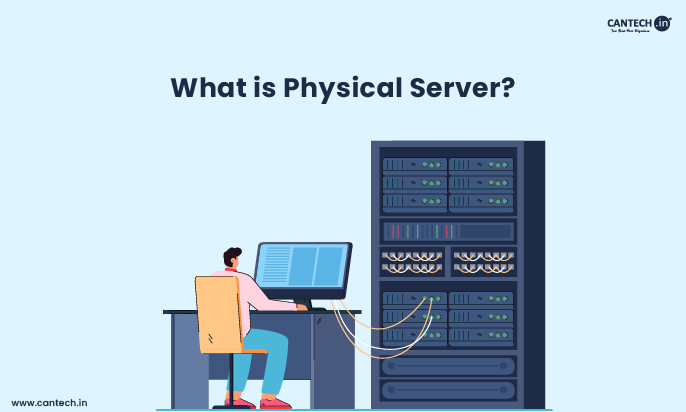All businesses need to connect to the internet. But with the internet comes risk. So, how do you stop hackers, viruses, and online attacks before they reach your computers? Well, a hardware firewall is the answer.
So, what is hardware firewall?
In this blog, we will explain that in detail through its meaning, working and features. Also, we will compare Hardware Firewalls vs Software Firewalls.
What Is a Hardware Firewall and How Does It Work?
The hardware firewall definition is simple. It is a physical security device that protects your internal network from unwanted internet traffic. It sits between your internet connection and your computer systems. Therefore, only safe traffic can pass through based on the rules set by the network admin.
Furthermore, this hardware-based firewall does not rely on your computer or operating system. It operates independently and keeps working even if any of your devices crash or become slow.
Most businesses use an HW firewall to ensure that every system inside their office network remains safe.
After hardware firewall meaning, now let us understand how a hardware firewall works and what it can do.
How Does a Hardware Firewall Work?
A hardware firewall works by filtering network traffic. It checks the data that enters or exits your network. This data is broken into packets, and the firewall examines each packet to decide whether it is safe or not. If it finds anything unusual or unsafe, it blocks that packet immediately.
Below are the different ways in which a hardware-based firewall functions:
1. Packet Filtering Based on Rules
The firewall uses a set of rules to check each packet’s source and destination address, port number, and protocol. If the packet does not match the rules, it is denied. This keeps out unauthorized traffic.
2. Stateful Inspection for Connection Tracking
The firewall monitors the state of every connection. If a packet belongs to an already-approved session, it is allowed. Otherwise, it is blocked. Well, this technique helps the firewall understand whether the traffic is part of a normal conversation or a suspicious one.
3. Deep Packet Inspection for Threats
Some firewalls are capable of inspecting the actual content inside each data packet. Also, this helps them detect malware, hidden viruses, or dangerous scripts that are not visible in the packet header.
4. Intrusion Prevention and Attack Blocking
Modern firewalls also include intrusion prevention systems. Moreover, they automatically detect patterns of known attacks and block them in real time. This protects the network from hackers and malware attacks.
5. Traffic Logs and Alerts for Admins
The firewall keeps a complete record of all the traffic it processes. If something goes wrong, the admin can check the logs to find the cause. Additionally, the firewall can also send alerts if any suspicious activity is detected.
6. Application Control and Protocol Filtering
Some hardware firewalls can understand which apps or services are using the internet. Therefore, they can block risky apps or allow only the approved ones. This gives better control over data usage inside the organization.
7. Policy-Based Access Control
You can set strict rules for who can access what is inside your network. For example, you can block internet access for printers or restrict certain teams from accessing sensitive files. This improves internal security.
Hardware Firewalls vs Software Firewalls – Brief Comparison
Here’s a comparison of hardware vs. software firewalls –
| Feature | Hardware Firewall | Software Firewall |
| Device Type | External physical unit | Internal software on the device |
| Protection Area | Entire network | One single device |
| Resource Usage | Uses dedicated hardware, so no load on your computer | Uses system RAM and CPU |
| Setup and Management | Centralized and unified | Individual setup for each PC |
| VPN and Threat Tools | Usually included | Depends on third-party software |
| Power Source | Needs external power | Runs with the host device |
| Ideal Use | Offices and business networks | Individual devices and home use |
This table shows the real difference in software vs hardware firewall performance and use.
Read More : Difference between hardware firewall and software firewall
Features and Benefits of a Hardware Firewall
These hardware firewall benefits show why businesses prefer hardware firewalls over other options when it comes to serious network protection.
1. Network-Wide Protection for All Devices
Unlike software firewalls that work only on a single device, a hardware firewall protects all devices connected to the same network. This includes desktops, laptops, printers, and servers.
2. Independent Security Layer
A hardware firewall works independently. It does not rely on your operating system or installed antivirus. So, even if your computer fails, the firewall continues to block threats at the gateway level.
3. High-Speed Performance
These devices are built with hardware components specially designed to handle large amounts of data traffic. Also, they inspect packets at high speed without slowing down your network.
4. Built-in VPN Support
Most hardware firewalls support virtual private network (VPN) features.
5. Advanced Threat Detection
They come with built-in tools to detect spam, ransomware, viruses, and zero-day threats. These tools scan every packet for known attack patterns and prevent threats from entering your system.
6. Centralized Dashboard for Easy Management
Admins can manage all settings from one central interface. They can view traffic reports, change firewall rules, create VPNs, and monitor threats without installing software on every device.
7. Regulatory Compliance Support
Hardware firewalls help you meet the security requirements of standards like GDPR, HIPAA, and ISO. They keep records of traffic and prevent unauthorized access. This is important during audits.
What is the Role of VPN in Hardware Firewalls?
Many hardware firewalls come with built-in VPN gateways. These VPN tunnels are encrypted between your internal network and remote users or branch offices. This way, even if the user is working from home or travelling, the data stays protected during transmission.
Furthermore, the firewall ensures that only authenticated users can connect through the VPN. It adds a strong security layer to your remote access strategy. Site-to-site VPN features also help organizations share data safely between their offices located in different cities.
In short, a VPN-enabled hardware firewall protects sensitive data and ensures secure access from anywhere.
Hardware Firewall Examples You Can Recognize
Several leading companies provide reliable hardware firewalls for businesses of different sizes. Let us look at some popular hardware firewall examples:
- Fortinet FortiGate – You get advanced firewall protection, VPN support, and threat prevention features.
- Cisco ASA Series – They give powerful network-level filtering and secure VPN connections.
- Palo Alto Networks Firewalls – Delivers next-generation features like deep application control and malware blocking.
- Check Point Firewall Appliances – The Government and finance sectors use it for their detailed rule management.
- SonicWall TZ Series – Trusted by small businesses for simple setup and strong performance.
Examples of software firewalls include Windows Firewall, pfSense, and ZoneAlarm Free Firewall.
Best Practices to Use a Hardware Firewall Properly
The steps below help your hardware firewall run smoothly and keep your network strong against cyber threats.
- Update firmware regularly from the vendor for new threat protection.
- Do not keep the default settings. Set rules carefully based on your team’s access needs.
- Review firewall logs regularly to check for strange activities.
- Make users connect via VPN through the firewall for safe access.
- Segment internal networks into zones. This makes it easier to protect critical systems like finance or HR.
- Enable IPS and DPI if your firewall supports them for better safety.
- Keep a Backup Configuration File. This helps you recover quickly if the device resets or crashes.
Conclusion
So, what is a hardware firewall? Well, it is a must-have device for any organization that wants complete control and protection over its internet traffic. It guards the entire network and blocks suspicious activity. Also, it helps you meet data protection standards.
Protect your servers with powerful hardware firewalls from Cantech. We offer secure hosting solutions with advanced firewall protection, fast setup, and full support. Reach us to discuss your custom needs!
FAQs
How does a hardware firewall work?
A hardware firewall checks each data packet that enters or leaves your network. It blocks harmful traffic by following security rules and allows only safe packets to pass.
What is a firewall and does it work?
A firewall is a security system that controls internet traffic based on rules. Further, it works by blocking unauthorised access and allowing only safe data through.
Which device is an example of a hardware firewall?
Fortinet FortiGate is one example of a hardware firewall. Other examples include Cisco ASA and Palo Alto firewalls used in offices and enterprise networks.
What are the three types of firewalls?
The three types of firewalls are packet-filtering firewalls, stateful inspection firewalls, and next-generation firewalls that include DPI and threat detection.
Which firewall is best?
The best firewall depends on your network size and security needs. For businesses, Fortinet, Cisco, and Palo Alto firewalls are widely trusted for their strong performance and advanced features.








